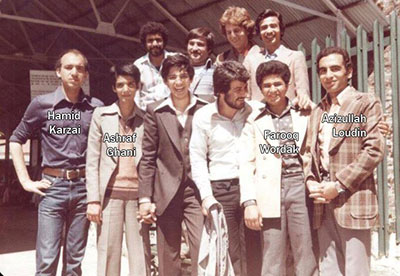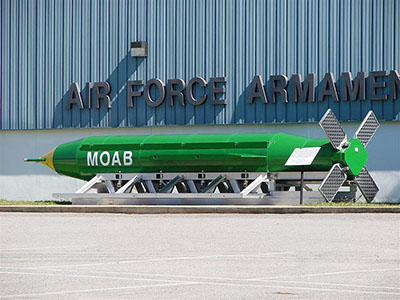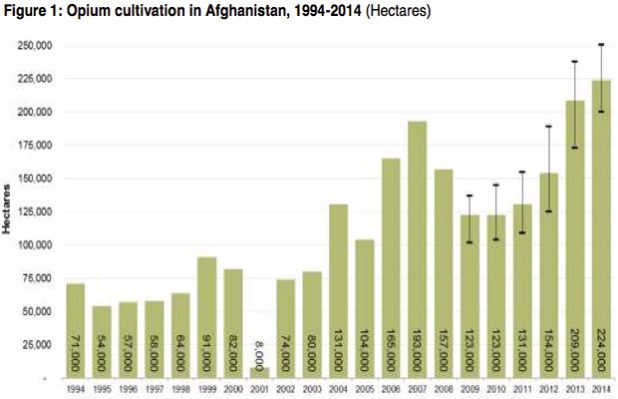By Revolutionary Association of Women of Afghanistan and Edu Montesanti
“Whoever sits in the White House will continue to serve the 1% and spread wars across the world, to maintain the US hegemony. Many corporations, arms manufacturers and corporate-employed mercenaries, benefit from the war itself, or from extravagant reconstruction opportunities the war destruction creates. The increase in the number of US troops is not to secure the country or annihilate the US creations, the Taliban and ISIS, but rather a show of US power to rivals, Russia, China and Iran.
Despite all their differences, the US and Iran’s aim in Afghanistan converge on one point: the promotion of fundamentalist thought, and continued support for the most reactionary, dark-minded and criminal fundamentalist elements. While the US killed hundreds of Afghan revolutionaries and freedom-fighters through its fundamentalist mercenaries in the 1980s and 90s, it used these tactics to prevent the rise of nationalist, freedom-fighting and independent figures and forces that would resist its occupation and bullying,” says Friba, RAWA’s representative.
*
Edu Montesanti: Please speak on the protest in Kabul last October: What exactly did hundred of Afghans protest that day?
Friba, spokesperson for RAWA: The protest on October 6th, was staged by the Solidarity Party of Afghanistan (SPA) against the 16th anniversary of the US invasion of Afghanistan. SPA is a democratic, nationalist, progressive party that stands for independence, freedom, democracy, secularism, and equality. This protest is held by the party every year in October. The protestors called for the end of the occupation and intervention of the US and its allies in Afghanistan, as well as other regional powers. They carried placards showing gruesome US crimes in Afghanistan, and called for the end of the occupation with slogans like “No to occupation!”, “No to US and NATO military bases and forces in Afghanistan!”, “With the US, NATO and their stooges, peace and prosperity are nothing but mirages!”, and others.
The Party also raised slogans in condemnation of the Afghan puppet government composed of fundamentalist criminal Jehadis, and the recent peace deal made with the arch-criminal, Gulbuddin Hekmatyar.
SPA has also held demonstrations to condemn 28th April, or 8th Saur, the day the Jehadi fundamentalist criminals took power in Kabul in 1992 – the same Jehadis who make up the US puppet government today – and in solidarity with international freedom-fighting movements, such as the Kurdish struggle.
EM: You have told me about the Afghan youth being “bought” by the Empire. Please explain that, Friba.
Friba: It has been forty years since the US started working on its Afghan project, and investing in Afghan youth to make them its cadres was cardinal to its long-term aims in Afghanistan. The CIA educated and trained its lackeys, politically and militarily, creating loyal lackeys who would go on to constitute its future puppet government after it was to take over Afghanistan, and help it achieve its goals comfortably.
Some of its first recruits, through programs like the Peace Corp and enrollment in the American University of Beirut, were Zalmai Khalilzad, Hamid Karzai, Ashraf Ghani, Farooq Wardak, Azizullah Ludin, Yousuf Pashtun, and Anwar Ahadi, who have headed the Afghan government and other key positions of power since 2001.

Afghan politicians supported from youth by the US/CIA (Karzai among them).
2001 saw a fresh wave of programs that trained the youth to serve under the US’s direct occupation. Unfortunately, such US-educated and US-trained agents have increased in Afghanistan and are continuing to increase through programs like the Fulbright Program – Afghanistan is the highest recipient of this scholarship currently -, and Leadership Program International Visitor, which reek of CIA’s training methods.
In addition to the prominent pawns mentioned above, there are fresh cadres like Amrullah Saleh, Hanif Atmar, Nader Naderi, Javed Ludin, Asad Zamir, Wahid Omar, Siddique Siddiqui, Sima Samar, Dadfar Spanta, Saad Mohseni, Javad Tayyab, Azam Dadfar, Daud Muradyan, and others. After decades of investment, today, the US has enough of these civilian bureaucrats to form several generations of traitorous puppet states in Afghanistan.
It is worth mentioning that after the collapse of the so-called communist regime of 1978-1992, Khalqi and Parchami, many Afghan KGB agents and lackeys joined the circle of US lackeys, that is, the Islamic fundamentalist mercenaries as they took power after 1992.
Hanif Atmar, one of the most important figures of the current government, was an infamous torturer and killer of revolutionaries and intellectuals during the Khalq and Parcham period. Farid Mazdak, Noor ul Haq Oloomi, Mohammad Gulabzoy, Dastgeer Panjsheri, Abdullah Shadan, Shahnawaz Tanai, who was the Defense Minister in the Soviet puppet government but joined hands with the infamous fundamentalist warlord, Gulbuddin in a coup attempt, Khalil Zimar, and others. Writers like Latif Pedram, Rahnaward Zaryab, Partaw Naderi, Wasif Bakhtari, and others, also followed the same path and are still serving the US puppet government today.
NGOs in Afghanistan increased dramatically after the US invasion, another tool in the hands of the US to neutralize our youth from political revolutionary struggle against foreign invaders and their local lackeys. These NGOs receive huge sums of money from the US embassy and infamous bodies like USAID also widely involved in criminal anti-people projects in Latin America since its inception, and have created a new, fake class of youth who are earning hefty sums of money in return for forwarding US aims in our country.
The spreading of this “cultural imperialism” has always been the duty of US-supported NGOs around the world. The youth in these NGOs today only see the interest of the US in Afghanistan and propagate for the US, not for their people or their country.
These young boys and girls have been brainwashed with money and power and promises of comfortable lives abroad, distancing them from nationalist, progressive struggle for the independence and freedom of our country. Dark-minded fundamentalist groups such as Jamiate Islahe Afghanistan, a Salafi organization, are also sponsored with US Dollars to spread Ikhwani and ignorant thoughts among youth.
These fresh recruits not only occupy high positions in the state, but are also the creator and donors of the majority of NGOs and so-called “free” media outlets in Afghanistan. These outlets actively work to control the public opinion in favor of the US colonization. USAID is again the main donor of these bodies in Afghanistan.
Universities, both private and government, also follow a syllabus and method of teaching that is pro-imperialism and pro-US, particularly pro-US occupation. Youth are taught to accept the US occupation as a natural and necessary action to save our country, and generally avoid talking about politics, against the government, and especially to avoid discussing progressive, revolutionary topics. When the current president, Ashraf Ghani, became the head of the Kabul University in 2005, he made sure no political discussions or activities were carried out in the university.
All these efforts helped prevent the emergence of an active anti-occupation force from the youth.
Iran has had a great deal of success in Afghanistan in spreading cultural and political influence as well, maybe even more so than the US itself. For the past three decades, the theocratic Iranian regime has also invested and worked on its traitorous Afghan agents, both militants and intellectuals, and created and funded Islamic fundamentalist parties and organizations of its own kind in Afghanistan, like Wahdate Islami party, Ittelaf Milli, and Harkate Sheikh Mohseni.
Today, in addition to aiding the criminal Taliban and buying people in the government (former president, Karzai, admitted that his office received bags of cash from Iran), Iran has a handful of so-called “intellectuals” at its disposal who are the mouthpieces of the fascist Iranian regime and are actively working in Iran-funded television channels and newspapers to spread the Iranian-style Vilayat-e-Faqih virus in our country, and to educate and train youth for the same purpose.
Among these are Kazim Kazimi, Husseini Mazari, Rizwani Bamyani, Noor Rahman Akhlaqi, Zikria Rahil, Jawad Mohseni, and others. Just like the US, Iran also shrouds its intelligence and cultural activities in our country under popular phrases like “humanitarian aid”, and so-called charity organizations like the Imam Khomeini Relief Foundation. These activities mark the more dangerous kind of intervention by the Iranian regime. As one high-ranking official in the government told Wall Street Journal in 2012, “Iran is the real influence here. With one snap of their fingers, they can mobilize 20,000 Afghans. This is much more dangerous than the suicide bombers coming from Pakistan.” Despite all their differences, the US and Iran’s aim in Afghanistan converge on one point: the promotion of fundamentalist thought, and continued support for the most reactionary, dark-minded and criminal fundamentalist elements. This is why the US has not prevented these activities in our country.
The US has never worked in a country for its prosperity, rather for its own interests and aims. While the US killed hundreds of Afghan revolutionaries and freedom-fighters through its fundamentalist mercenaries in the 1980s and 90s, it used these tactics to prevent the rise of nationalist, freedom-fighting and independent figures and forces that would resist its occupation and bullying.
EM: How do you see Afghanistan today since Donald Trump took power in January 2017, in comparison to President Obama’s years? What are your thoughts on President Trump’s new “strategy” to your country?
Friba: Despite differences in their domestic policies, what is absolutely certain is that the US policy abroad does not change under new presidents. Afghanistan’s situation is not and will not be much different under Trump than it was under Obama. Trump’s wars, like Obama and Bush’s, are wars of conquest.
Whoever sits in the White House will continue to serve the 1% and spread wars across the world, to maintain the US hegemony. US corporations want the oil and other raw materials of occupied countries, to privatize state-owned companies, and to sell U.S. products in the new markets the war opens for them. Many corporations, arms manufacturers and corporate-employed mercenaries, benefit from the war itself, or from extravagant reconstruction opportunities the war destruction creates.
Trump’s period, more than ever before, shows the cracks in the crumbling, rotting US system. Trump’s own continual failure at constructing his cabinet and staff, allegations of Russian interference in the elections, the conflicts between the White House and the Congress, the lost Syrian war, the Afghan and Iraq war quagmires, and the overall deteriorating situation in the US society itself – increasing inequality, dwindling social facilities, mass shootings, rampant racism against African-Americans and other minorities, and countless other issues -, are just some of the US’s current problems.

In turn, Russia and China’s huge financial and military gains also break the US’s might and arrogance. The US is in denial of its defeat, and is desperately clinging to its last hope for global domination by occupying Afghanistan. The firing of the MOAB [Massive Ordnance Air Blast] and increase of troops are demonstrations of power to its rivals. The US knows that if it leaves Afghanistan, it will be a repetition of the Vietnam War nightmare, and it just cannot afford to do that, not in the face of emerging Russia and China power.
Despite the huge amount of media coverage surrounding the so-called “new strategy” announced by Trump, the strategy really had nothing new. It is the continuation of the warmongering, aggression and bullying policies of the US which will further sink our country in occupation and the bloody rivalries of world powers. The long-term aims of the US in our country and the region remain unchanged – to occupy Afghanistan for its geostrategic purposes of full domination by overcoming its regional rivals, namely Russia and China.
The fluctuation of the number of troops, which has continuously been happening in the past 16 years, does not change, and has not changed this strategy and policy. Only now, the US plans to plunder the minerals in Afghanistan, worth billions of dollars, to try and finance its new war costs. Trump mentioned his interest in the matter in a phone call with Ashraf Ghani and the traitor president accepted the demand immediately.
The increase in the number of US troops is not to secure the country or annihilate the US creations, the Taliban and ISIS, but rather a show of US power to rivals, Russia, China and Iran. The reinforcement of air power under the new strategy, killed tens of civilians in blind bombardments carried out by the criminal US army in several parts of Afghanistan in just a few weeks.
The only people cheering for this “new” strategy are heads of the mafia puppet government of Afghanistan and their intellectual lackeys, because their master has decided to elongate their ominous lives by extending its stay in our country.
We should not be deceived by the US’s “pressure” on Pakistan either. The history of the US and Pakistan go back decades when the filthy government and terrorist-fostering army of Pakistan trained and exported the most bloodthirsty and reactionary groups to our country, in accordance with the orders and dollars of the White House.
The US was also well-informed on the role of Pakistan in empowering the Taliban in the past sixteen years, but still gave billions of dollars in aid and military equipment to the country because next to its puppet government in Kabul, the West needed its Taliban creations to justify its military presence and legalize its war in Afghanistan.
Trump basically attempted to drag Pakistan and India into a war in Afghanistan, and warned Pakistan on its growing closeness with Russia and China, rather than actually pressurizing it to stop supporting the Taliban and other terror groups.
EM: What can you say about the old CIA drug smuggling from your country?
Friba: The CIA has a long history of being involved in the global drug trade in all parts of the world under the control of the US or where it has considerable influence. While a few cases have been investigated and exposed by journalists, the issue continues to remain in the shadows.
The CIA’s history with drug trade began in the 1980s. Drugs were seen as the quickest and easiest way to earn money to fund CIA proxies and paramilitary forces, in different countries. Gary Webb, the brave journalist who exposed the Nicaraguan Contra drug trafficking scandal and was eventually driven to suicide by an extensive smear campaign by the mainstream media, described the process like this:
“We [the CIA] need money for a covert operation, the quickest way to raise it is sell cocaine, you guys go sell it somewhere, we don’t want to know anything about it.”
This tactic worked very successfully in Afghanistan during the Cold War, when the Mujahideen forces serving the US were funded through drugs.

US troops in opium field in Afghanistan.
Before the US invasion in 2001, the drug production had almost been completely eradicated by the Taliban [See table below]. Right after the US invasion, drug production began increasing drastically, and today Afghanistan produces 90% of the world’s opium, and on the verge of becoming a narco-state. There are reports of US forces admitting that drugs are flown out of Afghanistan in US planes.
Ahmad Wali Karzai, the now dead governor of Kandahar province, was at one time the biggest drug dealer of not just Afghanistan, but the region. The whole time, he was on the payroll of the CIA. There have even been claims by US officers directly involved in drug operations in Afghanistan, about the CIA’s involvement.
A DEA agent, Edwrad Follis, stated that the CIA “turned a blind eye” to the drug trade in Afghanistan. Most recently, John Abbotsford an ex-CIA analyst and war veteran who fought in Afghanistan confessed that CIA had a role in drug smuggling operations.

Source: United Nations, Vienna
Even if we exclude these claims and reports, it is hard to believe that a superpower that boasts the most modern technology in surveillance and intelligence-gathering cannot find opium fields and track supply routes within a country it occupies.
The fact that 8 billion dollars have been spent in drug eradication efforts in the past decade but opium production has only soared, is itself an indication that the drug business serves some US interest in Afghanistan, or it would have been finished a long time ago.
Other players in this so-called ‘counter-narcotics’ efforts are private US contractors who earn millions of dollars through counter-narcotic contracts. One of the biggest beneficiaries is the notorious military company, Blackwater, which according to RT earned 569 million dollars from these contracts.
Private contractor companies have a huge share of the profits of the war in Afghanistan, and this failed drug war results in huge profits for them.
*
Edu Montesanti is an independent analyst, researcher and journalist whose work has been published by Nolan Chart, Truth Out, Pravda, Global Research, Telesur, Observatório da Imprensa, Caros Amigos magazine, and numerous other publications across the globe.

